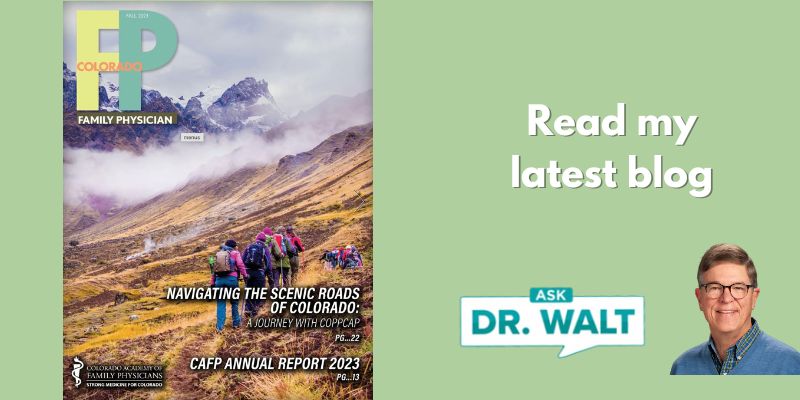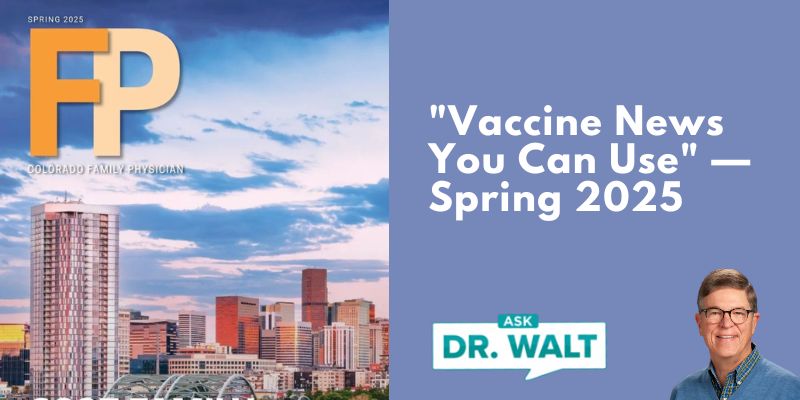
How can I tell if I’m allergic or not allergic to penicillin?
December 4, 2024
My father is chosen for the 2025 Army Officer Candidate School Hall of Fame
December 12, 2024I’ve been honored to write a quarterly column, “Vaccine News You Can Use” for the Colorado Family Physician journal for a number of years. Below is the Fall 2024 edition of CFP .

News Items:
- For your patients: The vaccines they’ll need this fall and winter
- Best practices for improving immunization rates among minority adults
- US transitioning from quadrivalent to trivalent flu vaccines
- Enhanced influenza vaccines benefit adults > 65 and older
- Measles cases in US triple from last year
- As measles makes a comeback, Colorado vaccination rates are ‘an accident waiting to happen
- COVID reinfections likely to be as severe but less likely to cause long COVID
- Patients vaccinated against COVID less likely to develop long COVID
- COVID still deadlier than influenza
- Maternal RSV vaccination: Recommendations and guidance
- Routine RSV vaccination for older adults recommended
VIEW ONLINE HERE. VIEW THE ENTIRE TEXT BELOW:
1. For your patients: The vaccines they’ll need this fall and winter
Time magazine had a nice article you may want to consider as a handout for your patients to remind them of the CDC recommended update vaccines for this fall. Among the changes: people ages 75 and older should get vaccinated against RSV, the COVID vaccine will target a new strain of the virus, and the updated flu shot for all people ages 6 months and older will include only three strains instead of the four in last year’s shot (see below). All of these vaccines may be given together. September and October remain the best times for most people to get vaccinated.
2. Best practices for improving immunization rates among minority adults
An excellent article in FPM describes how 5 family medicine practices that were part of the Improving Adult Immunization Rates Among Racial and Ethnic Minority Populations project increased adult vaccination rates among their patients from minority groups. Their outcomes show that we FPs are ideally suited to address the many challenges and barriers impacting vaccination rates, especially among historically marginalized and medically underserved populations.
INFLUENZA
3. US transitioning from quadrivalent to trivalent flu vaccines
The CDC announced that ALL US flu vaccines will be trivalent for the 2024-2025 season. The quadrivalent flu vaccines of the recent past were designed to protect people from influenza A(H1N1), A(H3N2), B/Victoria, and B/Yamagata. The trivalent flu vaccines will not include a B/Yamagata component as it has not been detected since 2020.
4. Enhanced influenza vaccines benefit adults > 65 and older
Compared with standard flu vaccines, adjuvanted or enhanced vaccines improve protection including reduced medical visits, hospitalizations, and deaths in older adults. A recent review confirmed these same benefits during flu seasons where the vaccine and circulating virus strains are mismatched. However, the ACIP does NOT recommend enhanced flu vaccines preferentially for adults > 65 years. Rather, these patients may receive any of the following flu vaccines: (1) trivalent high-dose inactivated (Fluzone High-Dose), (2) trivalent recombinant (Flublok), or (3) trivalent adjuvanted inactivated (Fluad). None of these contain any mercury. If none of these are available, then any other age-appropriate flu vaccine may be used. Remind your older patients that these high dose and adjuvanted flu vaccines may result in more temporary, mild side effects that can occur with standard-dose flu shots – such as pain, redness, or swelling at the injection site, headache, muscle aches, and malaise, but these almost always resolve with 1 to 3 days.
MEASLES
5. Measles cases in US triple from last year
The CDC reported 188 cases of measles from 13 measles outbreaks in 26 states and Washington, D.C. (at the end of July). There have been no reported deaths, but 93 people have been hospitalized – mostly children under 5 years old. This compares to 58 cases from 4 outbreaks in all of 2023. The CDC attributes the trend to declining vaccination rates in the US and a rise in measles cases worldwide associated with increase rates of international travel. Almost all cases were in persons who were unvaccinated or whose vaccination status was unknown. So far, there are none (yet) in Colorado
6. As measles makes a comeback, Colorado vaccination rates are ‘an accident waiting to happen’
CPR reported, “Not enough Coloradans, especially youngsters, are vaccinated against [measles] to prevent it from hitting the state with a vengeance. ‘We’re an accident waiting to happen,’ said … Immunize Colorado… One big warning sign: Just 88% of kindergarteners have gotten the MMR shot … according to the latest data from the state health department. Though that figure is an increase from last year, a percentage above 95% is considered ideal to provide community protection. The numbers are better, nearly 94%, when considering all Colorado schoolchildren from Pre-K through 12th grade … Perhaps most worrisome for Colorado, some pockets, especially in rural and underserved communities, have vaccination rates in the 70s and 60s. … In April, CDPHE sent text and email messages to about 75,000 families whose children may have been overdue for MMR vaccine based on state immunization records. That had an impact, leading to nearly 6,000 vaccinations. CDPHE is mailing around 72,000 reminder postcards this month.”
COVID
7. COVID reinfections likely to be as severe but less likely to cause long COVID
A study in Communications Medicine reported that if an initial infection of COVID is severe, it is likely a reinfection will cause severe disease again; however, long COVID is more likely to occur after an initial infection than after a reinfection.
8. Patients vaccinated against COVID less likely to develop long COVID
A study published in Nature Communications reported people with long-COVID who had been vaccinated against COVID, compared to unvaccinated cases, had at least a 10% lower risk of sensory, circulatory, blood and hematologic, skin and subcutaneous, and non-specific COVID-related disorders. The associations were stronger at younger ages.
9. COVID still deadlier than influenza
Patients hospitalized with COVID were 35% more likely to die than those hospitalized with flu during the fall and winter of 2023-2024, according to an analysis of Veterans Affairs data that was reported in JAMA.
RSV
10. Maternal RSV vaccination: Recommendations and guidance
An article in FPM updates FPs on the CDC and AAFP recommend use of a single dose of the Abrysvo maternal RSV vaccine for women from 32 through 36 weeks of gestation, which has the benefit of protecting infants from RSV for up to six months after birth. The vaccine should be administered from September through January for optimal protection.
11. Routine RSV vaccination for older adults recommended
The ACIP recommends a single RSV vaccination for all adults ages > 75 and for adults ages 60 to 74 at increased risk for severe disease. Although the FDA also approved the RSV vaccine for those ages 50 to 59 who are at increased risk of disease, ACIP has postponed a recommendation for this age group until further research is available. There are 3 RSV vaccines licensed for use in these age groups. Eligible adults can get an RSV vaccine at any time, but the best time to get vaccinated is in late summer and early fall before RSV usually starts to spread in the community.
A recent study estimated that if older people received the RSV vaccine at the same rate as the flu vaccine, it would cut hospitalizations and deaths by as much as 60 percent the first year. Early data shows that only about 17 percent of people 60 and older have gotten the RSV vaccine while about 70 percent of people 65 and older have gotten a flu shot. Familydoctor.org has information on RSV in adults over 60 that you can share with your patients.
MORE VACCINE NEWS:
-
COVID
- COVID vaccination reduced CV events in all adults (tinyurl.com/y899u2ew) but, in particular, hospitalization, and death in patients with HF
- COVID vaccination reduced prevalence of asthma symptoms
- Almost 10% of pregnant women infected with COVID develop long COVID
- Maternal COVID vaccination lowers risks for preterm birth and adverse neonatal outcomes
- First-trimester maternal COVID vaccination shows no increase in birth defects
- Researchers study nasal COVID vaccine effectiveness
-
COVID AND INFLUENZA
- Moderna’s COVID/influenza combination vaccine superior to separate shots
-
H5N1 (Bird Flu)
-
HIV
-
HPV
-
INFLUENZA
-
MALARIA
-
MPOX
-
PERTUSSIS
-
RSV
-
SHINGLES
-
VARICELLA
Abbreviations used:
- AAFP – American Academy of Family Physicians
- ACIP – Advisory Committee for Immunization Practices
- CDC – Centers for Disease Control and Prevention
- CDPHE – Colorado Department of Public Health and Environment
- CME – Continuing Medical Education
- COVID – COVID-19, SARS-CoV-2
- CPR – Colorado Public Radio
- CV – cardiovascular
- FPM – a magazine formerly know as Family Practice Management
- FPs – family physicians
- H5N1 – HPAI A(H5N1) virus, avian flu, bird flu
- HIV – human immunodeficiency virus
- HPV – human papillomavirus
- JAMA – Journal of the American Medical Association
- flu – influenza
- MMR – measles, mumps, and rubella
- NNT – number needed to treat
- NYC – New York City
- RCT – randomized controlled trial
- RSV – respiratory syncytial virus
- SARS-CoV-2 – severe acute respiratory syndrome coronavirus 2
- UN – United Nations
- UNAIDS – Joint United Nations Programme on HIV/AIDS
- US – United States
© Copyright WLL, INC. 2024. This blog provides healthcare tips and advice you can trust about a wide variety of general health information only and is not intended to substitute for professional medical advice, diagnosis, or treatment from your regular physician. If you are concerned about your health, take what you learn from this blog and meet with your personal doctor to discuss your concerns.



